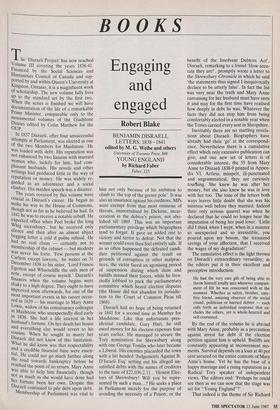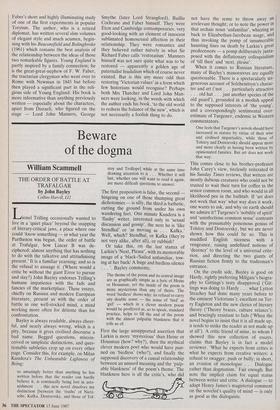BOOKS
Engaging and engaged
Robert Blake
BENJAMIN DISRAELI, LETTERS: 1838 —1841 edited by M. G. Weibe and others
University of Toronto Press, $60
YOUNG ENGLAND by Richard Faber
Faber, f15
The 'Disraeli Project' has now reached Volume III covering the years 1838-41. Financed by the Social Sciences and Humanities Council of Canada and sup- Ported by and within Queen's University at Kingston, Ontario, it is a magnificent work of scholarship. The new volume fully lives up to the standard set by the first two. When the series is finished we will have documentation of the life of a remarkable Prime Minister, comparable only to the monumental volumes of the Gladstone Diaries edited by Colin Matthew for the OUP.
In 1837 Disraeli, after four unsuccessful attempts at Parliament, was elected as one of the two Members for Maidstone. He was loaded with debt. His reputation was not enhanced by two liaisons with married women who, luckily for him, had com- plaisant husbands. His novels and other writings had produced little in the way of reputation or money. He was widely re- garded as an adventurer and a social climber. His maiden speech was a disaster. The years covered by this volume were crucial in Disraeli's career. He began to make his way in the House of Commons, though not as far as he believed he had. In 1841 he was to receive a notable rebuff. He expected office when Peel broke the long Whig ascendancy, but he received only silence and then after an almost abject begging letter a cold if polite refusal. He had no real claim — certainly not to membership of the cabinet — but modesty was never his forte. 'Few persons at the Carlton except lawyers,' he writes on 31 December 1838 to his sister, 'Lord Francis Egerton and Wharncliffe the only men of note, except of course myself.' Disraeli's finances when the volume begins were shaky to a high degree. They ought to have improved soon afterwards, for one of the most important events in his career occur- red in 1839 — his marriage to Mary Anne Lewis, widow of his constituency colleague at Maidstone who unexpectedly died early in 1838. She had a life interest in her husband's fortune. On her death her house and everything else would revert to his cousins. When he sought to marry her Disraeli did not know of this limitation. What he did know was that respectability and a credible financial base were essen- tial. He could not go much further along the road towards bankruptcy before he reached the point of no return. Mary Anne was able to help him financially, though not as much as she would have done had her fortune been her own. Despite this Disraeli continued to pile debt upon debt. Membership of Parliament was vital to him not only because of his ambition to climb to 'the top of the greasy pole'. It was also an insurance against his creditors. MPs were exempt from that most ominous of threats, immortalised by Dickens, incar- ceration in the debtor's prison, not abo- lished till 1869. This was an important parliamentary privilege which biographers tend to forget. It gave an added zest to victory and terror to defeat. Not that the winner could even then feel entirely safe. If as so often happened the defeated candi- date petitioned against the result on grounds of corruption or other malprac- tices, the victor faced an agonising period of suspension during which duns and bailiffs massed their forces, while he fren- ziedly lobbied to pack the parliamentary committee which heard election disputes (the House did not abandon its jurisidic- tion to the Court of Common Pleas till 1868).
Disraeli had no hope of being returned in 1841 for a second time as Member for Maidstone. Like that unfortunate pres- idential candidate, Gary Hart, he still owed money for his election expenses four years earlier. He managed to secure the Tory nomination for Shrewsbury along with one George Tomlin who later became a Liberal. His enemies placarded the town with a list headed 'Judgements Against B. D'Israeli Esq' setting out his alleged un- satisfied debts with the names of creditors to the tune of £22,036.2.11 . 'Honest Elec- tors of Shrewsbury! Will you be repre- sented by such a man...? He seeks a place in Parliament merely for the purpose of avoiding the necessity of a Prison, or the benefit of the Insolvent Debtors Act'. Disraeli, remarking to a friend 'How accu- rate they are!', promptly wrote a letter to the Shrewsbury Chronicle in which he said `the statements thus signed I inequivocally declare to be utterly false'. In fact the list was very near the truth and Mary Anne canvassing for her husband must have seen it and may for the first time have realised how deeply in debt he was. Whatever the facts they did not stop him from being comfortably elected in a notable year when the Tories carried every seat in Shropshire.
Inevitably there are no startling revela- tions about Disraeli. Biographers have already had their 'go' at the correspond- ence. Nevertheless there is a cumulative effect which only extensive publication can give; and one new set of letters is of considerable interest, the 55 from Mary Anne to Disraeli 1838-9 printed in Appen- dix VI. Artless, misspelt, ill-punctuated and ungrammatical, they are curiously touching. She knew he was after her money, but she also knew he was in love with her too. The tone of the letters both ways leaves little doubt that she was his mistress well before they married. Indeed their only serious quarrel was when he declared that he could no longer bear the imputation of being her paid lover. 'Little did I think when I wept, when in a manner so unexpected and so irresistible, you poured upon my bosom, the treasured savings of your affection, that I received the wages of my degradation!'
The cumulative effect is the light thrown on Disraeli's extraordinary versatility; as the editors put it in their excellent and perceptive introduction: He had the very rare gift of being able to throw himself totally into whatever compart- ment of life he was concerned with at the moment. Whether as suitor, brother, care- free friend, amusing observer of the social round, politician or harried debtor — each calls forth an individual response that ex- cludes the others, yet is whole-hearted and self-contained.
By the end of the volume he is abroad with Mary Anne, probably as a precaution against arrest for debt if the election petition against him is upheld. Bailiffs are constantly appearing at inconvenient mo- ments. Survival depends on a loan at 40 per cent secured on the entire contents of Mary Anne's house. Yet he has the base of a happy marriage and a rising reputation as a Radical Tory speaker of independent views. The editors end: 'Perhaps he could see then as we can now that the stage was set for "Young England"?'
That indeed is the theme of Sir Richard Faber's short and highly illuminating study of one of the first experiments in popular Toryism. The author, who is a retired diplomat, has written several slim volumes of elegant style and much acumen, begin- ning with his Beaconsfield and Bolingbroke (1961) which remains the best analysis of the relationship between the ideas of those two remarkable figures. Young England is partly inspired by a family connection; he is the great-great-nephew of F. W. Faber, the tractarian clergyman who went over to Rome with Newman in 1845 but before then played a significant part in the reli- gious side of Young England. His book is more informative than anything previously written — especially about the characters, apart from Disraeli, who figured on the stage — Lord John Manners, George Smythe (later Lord Strangford), Baillie Cochrane and Faber himself. They were Eton and Cambridge contemporaries, very good-looking with an element of innocent sublimated homosexual affection in their relationship. They were romantics and they believed rather naively in what Sir Richard Faber calls 'restoratism'. Manners himself was not sure quite what was to be restored — apparently a golden age of paternalist feudalism which of course never existed. But is this any more odd than restoring 'Victorian values' in a form which few historians would recognise? Perhaps both Mrs Thatcher and Lord John Man- ners were looking, in the words with which the author ends his book, `to the old world to redress the balance of the new', which is not necessarily a foolish thing to do.




























































 Previous page
Previous page